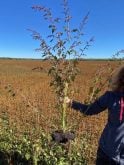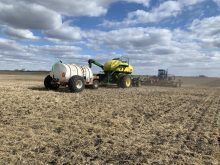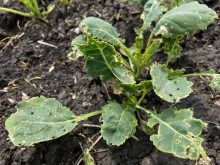Monsanto’s sharedrisk program, which over the last 11 seasons refunded almost $40 million to western Canadian canola growers who lost Roundup Ready canola crops early in the growing season, has been scrapped.
“The long and short of it, even though the grower wouldn’t see this, the cost of the program obviously outweighed the benefits,” said Monsanto spokeswoman Trish Jordan.
The program, which started in 2000, initially refunded farmers the $15-an-acre Technical Use Agreement fee paid to Monsanto for Roundup Ready canola seed, if the crop failed early in the season. As the program evolved, the farmer had to have been using Monsanto’s WeatherMax glyphosate.
Read Also

Critical growing season is ahead for soybeans
What the weather turns out to be in the United States is going to have a significant impact on Canadian producers’ prices
DIFFICULT TO JUSTIFY
As cheaper gener i c glyphosate hit the market, Monsanto couldn’t earn as much from its WeatherMax herbicide.
“It was difficult for us to justify the level of servicing and benefits that we were providing with that risk-share program without the accompanying cost benefit on the other side,” Jordan said.
Monsanto recently notified Roundup Ready canola growers of the change by letter.
“We are exploring a number of new sales concepts that hopefully do a better job for the grower and for us in terms of providing a benefit… ,” she said. “Our folks in sales are trying to figure out a way to develop something and take that money that is not going into risk share and design something that might be more appealing to growers or to give back to their communities somehow.”
PAYOUTS
Monsanto paid out on 10,500 claims under the program. This year around 1,100 farmers received almost $2 million. Despite widespread wet conditions this spring, 2010 was not the biggest paying year.
That was in 2002, when Monsanto refunded $11 million to 3,000 farmers who lost 725,000 acres of Roundup Ready canola due mainly to drought. Most of the claims came from Alberta and Saskatchewan.
Monsanto had hoped its program would boost sales, but farmers said it wasn’t the deciding factor in selecting Roundup Ready canola, Jordan said. In fact, the program sometimes angered farmers because they missed the application deadline or hadn’t met the criteria to qualify.
“It’s understandable,” Jordan said. “Farmers are under stress and when they don’t get a crop they’re upset, but we want a program farmers would be happy with. Our experience shows that wasn’t the case.”
Dow AgroSciences and DuPont don’t offer sharedrisk programs.
However, Bayer CropScience and BASF officials say their programs are continuing.
DIFFERENT PROGRAMS
Under Bayer CropScience’s TraitGuard program farmers get back the trait fee included in each bag of InVigor hybrid or other LibertyLink canola seed for acres that have been reseeded or taken out of production by June 30. Farmers who reseed with InVigor are eligible for additional compensation.
This year Ba y e r CropScience had 3,000 claims from farmers, said spokesman Derrick Rozdeba. He declined to say how many acres were affected or how much paid out.
The minimum claim under TraitGuard is 40 acres. Eligible acres must be taken out of production by spraying or cultivation no later than July 15. Acres deemed “lost” but kept for harvest are ineligible.
For areas reseeded with InVigor there’s a $20-an-acre rebate to a maximum of $200 a bag multiplied by the total number of bags purchased.
For areas taken out of production, the compensation is $10-an-acre to a maximum of $100 a bag multiplied by the total number of bags purchased.
For areas reseeded to any other crop type or variety there’s $10 an acre refund to a maximum of $100 a bag multiplied by the total number of bags purchased.
Unlike Monsanto and Bayer CropScience, BASF doesn’t market seed, however, it does have a modest shared-risk program under its Clearfield Commitment. Under the program farmers can get a refund of $30 per bag of Clearfield canola seed (about $10 an acre) when the crop fails early in the growing season, said Harley House, BASF’s Clearfield crops brand manager.
“We had our share of acres that were lost (this year),” he said.
Syngenta Seeds, through its NK line of corn and soybeans, covers half the cost of reseeding if one of its varieties fails early in the season, said Ron Taylor, Canadian marketing manager for Syngenta Seeds Canada.
“This is a really important piece of what we’re providing to our customers,” Taylor said.
———
“Weareexploring anumberofnew salesconceptsthat hopefullydoa betterjobforthe growerandforusin termsofproviding abenefit…”
– TRISH JORDAN



















